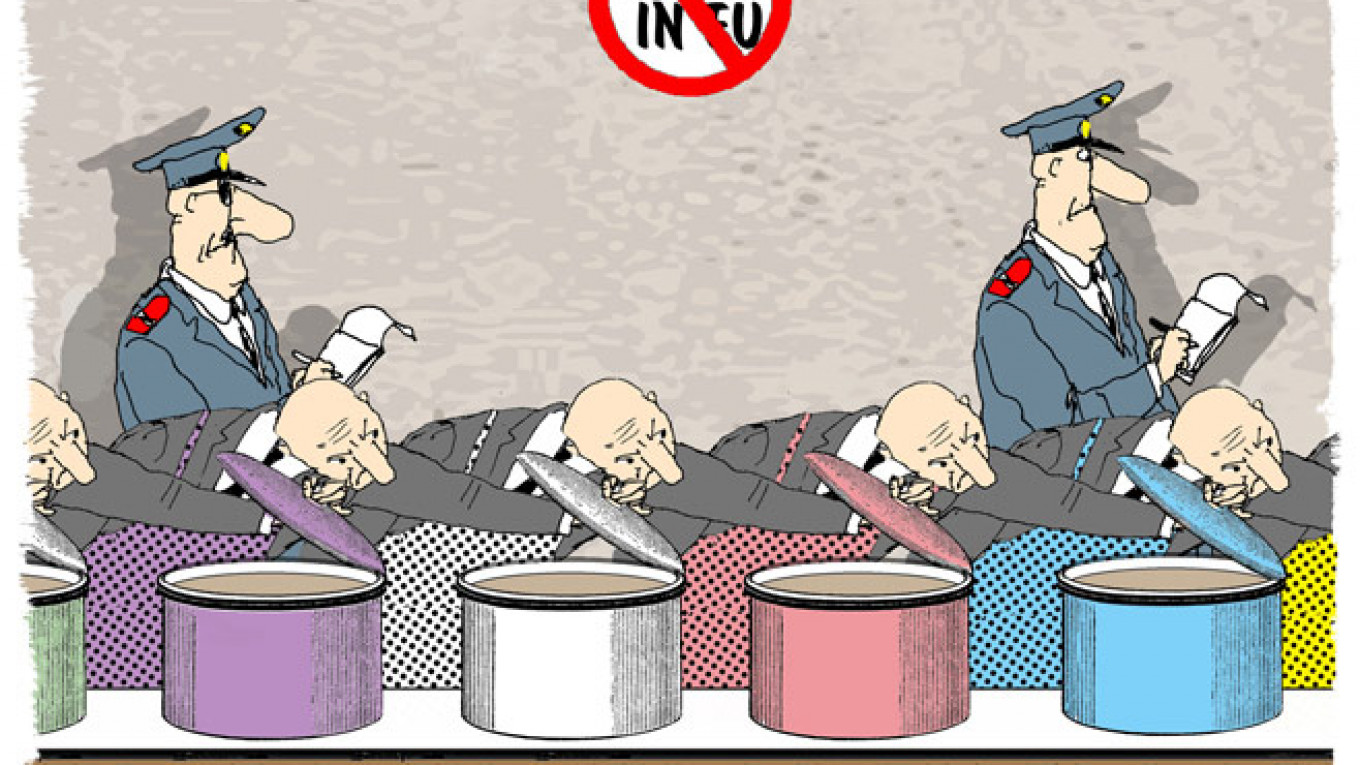It's not hard to picture. A friend takes a holiday abroad and brings back a little something from the local area for you — some French Brie, maybe, or dried Spanish sausages. You consume it, likely enjoying the gift even more because it's not available for purchase in Russia. Then you put the wrappings in the trash, leaving the bag in the hall to take to the garbage bins in the morning.
The foreign letters on the wrapping are a dead giveaway to your neighbor, however, who is still annoyed about the overly loud dinner party you threw last week, and reports you to the police for consuming a banned foodstuff.
This scenario remains — for the time being — hypothetical, but the Russian government is continuing to escalate its aggression against "counter-sanctioned" food products. Telephone hotlines run by the Russian Prosecutor General's Office have opened across the country in recent weeks, ready to take calls from citizens about sightings of outlawed food items.
The hotline service is technically for reporting the commercial sale of prohibited food, and the ban isn't supposed to apply to foreign products brought into Russia for personal use. Still, packs of jamon and jars of caviar have reportedly been confiscated at Moscow's airports, and at least one keen-nosed (and, reportedly, drunk) citizen of Vladivostok already called the police on his neighbors after smelling the aroma of someone cooking an illegal Polish goose. It's still legal to consume the banned foreign foodstuffs, but for how long?
Enthusiasm for finding and destroying the forbidden edibles is building, with hundreds of tons of prohibited products bulldozed, buried, or burned in August. The glee in hunting these items down is probably best embodied in one recent incident where former rock band member Stas Baretsky visited a St. Petersburg branch of French supermarket chain Auchan, with a group of Cossacks and camera crew in tow, to search for any hint of banned consumables.
While they didn't actually find any products in violation of the law, Baretsky still took the opportunity to make a spectacle by biting cans of Tuborg beer in half in a foamy-mouthed display of scorn. Beer is not actually on the list of illegal foods, but that seemed to matter little to the group, who were shown on video poking around and investigating other foreign-sounding food labels, demanding "What has Spain ever done for us?" in rhetorical outrage.
Russia's decision to destroy its masses of confiscated food imports is controversial, though a recent VTsIOM poll found that more Russians support the idea than oppose it. Baretsky's showboating may not reflect the average Russian's actual attitude on the matter, but his performance still displays several alarming developments in the witch hunt for illicit goods.
For one, the food counter-sanctions are no longer a purely political issue, but are taking on a patriotic fervor. Consuming American pork, to some Russians, is equivalent to betraying their country: it is supporting the enemy. The appearance of the hotline is an added threat that can be used to reinforce this mentality and exert pressure on friends and relatives — at the dinner table and beyond — on a personal level that was not previously possible.
The escalation shows that the Russian government is developing a new element in its so-called propaganda war: the people. Previously, Russia's anti-Western campaign was relatively one-sided, conducted by the government and the state-controlled mass media while the role of the average citizen was limited to observing developments from the sidelines.
Now, Russians are for the first time being given an official platform to participate individually by observing and communicating the suspicious activities of others. The power of reporting is being put in the hands of the people, almost as a way to test just how well that propaganda has been working. And as Russia well knows from its own history, encouraging people to turn against each other in the name of patriotism doubles as a way to spread fear and distrust throughout the population.
What began as a defiant response to Western sanctions has, in one short year, spiraled into a state-wide hunt for "unpatriotic" food and prosecution of parties responsible for distributing it — and it's not a far leap to making the very consumption of those products illegal as well. It may not be long before the image of someone sneaking a bite of a banned chocolate bar while looking over their shoulder is less a comedic caricature and more a bleak reality.
Kristen Blyth is an analyst at Salamanca Group. She specializes in due diligence and risk consulting projects across Russia and the former Soviet Union.
A Message from The Moscow Times:
Dear readers,
We are facing unprecedented challenges. Russia's Prosecutor General's Office has designated The Moscow Times as an "undesirable" organization, criminalizing our work and putting our staff at risk of prosecution. This follows our earlier unjust labeling as a "foreign agent."
These actions are direct attempts to silence independent journalism in Russia. The authorities claim our work "discredits the decisions of the Russian leadership." We see things differently: we strive to provide accurate, unbiased reporting on Russia.
We, the journalists of The Moscow Times, refuse to be silenced. But to continue our work, we need your help.
Your support, no matter how small, makes a world of difference. If you can, please support us monthly starting from just $2. It's quick to set up, and every contribution makes a significant impact.
By supporting The Moscow Times, you're defending open, independent journalism in the face of repression. Thank you for standing with us.
Remind me later.






